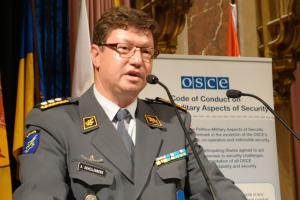20th anniversary of the OSCE Code of Conduct on Politico-Military Aspects of Security
When
Where
Organized by
Recognizing the importance of democratic civilian control of the armed and security forces, the Forum adopted in 1994 a Code of Conduct on Politico-Military Aspects of Security. This unique document represents a landmark in security sector governance, by obliging participating States to provide for democratic oversight of their armed, internal, paramilitary, intelligence and police forces. The Code of Conduct also includes key principles on relations between states. States are obliged to ensure that their armed forces remain politically neutral and to guarantee that the human rights of security personnel are respected. States report back on national practices annually, helping to build confidence and security in the OSCE region.
On the occasion of the 20th anniversary of the Code of conduct on politico-military aspects of security, Switzerland as country chairing the OSCE, Austria, Germany and Moldova as the current Chair of the Forum for Security Co-operation held two events: a ceremony at the Museum of Military History on 8 July 2014, and the Annual implementation meeting on 9 July 2014 at the Hofburg in Vienna.
Lieutenant General Aldo C. Schellenberg, Chief of Swiss Air Force: "20 years after its adoption, the Code of Conduct gained once again an “unwanted” actuality during the ongoing conflict in Ukraine. While the emphasis was laid in the past years on intra-State aspects such as democratic control of armed and security forces, the implementation of IHL and LOAC and the safeguarding of rights and duties of armed and security forces personnel, the last months have shown a growing need to re-focus on inter-State aspects such as the right to freely choose its own security arrangements, the respect for each other's sovereign equality and individuality and the organization of mutual security relations among participating States upon a co-operative approach. The good news are that since its entering into force, the Code of Conduct has never been as “popular” in the OSCE area as during the last couple of years. Improvement and further development of its implementation as well as outreach activities towards the OSCE Partners for Co-operation are pursued with an unprecedented intensity. The bad news however are that today more than ever during those last 20 years, norms and principles of the Code of Conduct have been breached and even violated with an discouraging frequency. Therefore, the OSCE community is called on continuing their relentless efforts of strengthening continuously its provisions and fostering security and confidence building in the OSCE area and beyond."
Thomas Göbel, Head of Arms Control Division of the German Foreign Ministry: "It is the first international document that codifies the principle of democratic control of the armed forces – a principle that due to Germany’s history is very dear to us and that is deeply rooted in our constitution."
“This evening we are celebrating the Code of Conduct in a museum, where the memory of the beginning of WWI is very present. The car, in which Francis Ferdinand and his spouse were shot to death, his uniform jacket and other items remembering the tragic events 100 years ago are right next to us. Sometimes I’m wondering if the Code of Conduct would have been of any help in those days to avoid this catastrophe of the last century.”
READ full address by Thomas Göbel, Head of Arms Control Division of the German Foreign Ministry here.
Dr. Werner Fasslabend, President of the Austrian Institute for European and Security Policy (AIES) and President of the Political Academy, former Federal Minister of Defence of Austria from 1990 to 2000 and Member of the Parliament, reminded participants that participating States agreed upon Code of Conduct in 1994 despite the difficult political and security situation in Europe. He emphasized among other principles of the Code the innovation of the democratic control of armed forces and the right of each state to freely chose its own security arrangement. During the Georgian crisis in 2008, and now, during the Ukrainian crisis important principles of Code of Conduct have been disregarded and this cannot be accepted, he said, urging all participating States to comply with all provisions of the Code of Conduct.





